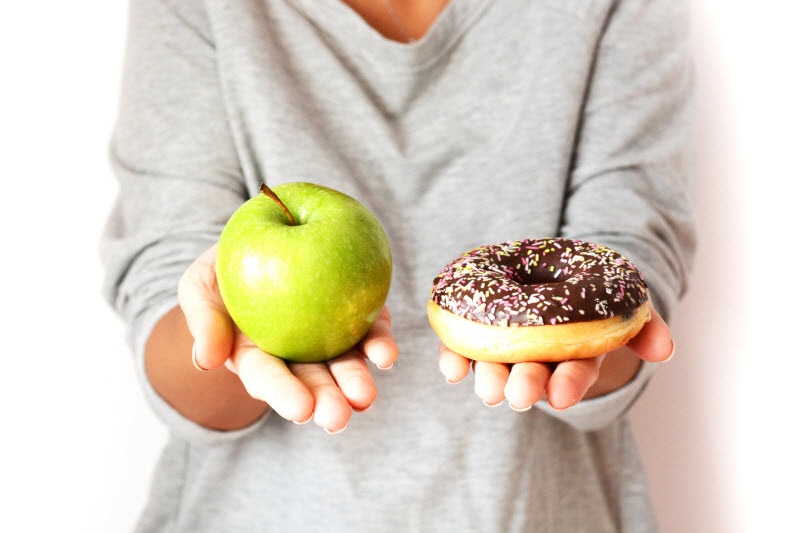With a new year underway, your plans for a ‘healthier you’ in 2021 may be in motion. Part of those plans may be to improve what you eat (and good for you!). As you progress through the next few weeks and months, it’s possible you’ll hit some roadblocks. Food cravings are likely to be one of them.
Perhaps not surprisingly, cravings affect 90% of the population at some point or other. Food cravings can vary, but the most common include sweets, carbs or fatty, processed or salty foods. You might experience a combination of these cravings, too. Typically, our yearnings are for foods that are high in calories or substances that aren’t exactly good for us.
It’s easy to feel like a failure once you give in to these urges. But there are many reasons why cravings exist. Instead of getting down on yourself, take some steps to prep for productive food outcomes.
1. Find your triggers
Do you overeat or reach for unhealthy foods at a particular time? Maybe it’s during the mid-afternoon slump at work, or right before it’s time for bed. If so, you can plan by scheduling some healthy snacks before that period hits. Having some healthy food alternatives ready will keep you away from those less desirable items.
What types of foods do you crave? An honest look will help you figure out your go-tos so you can heed off cravings before they overwhelm.
2. Make sure you’re eating regularly and healthfully
If you haven’t already, take some time to figure out your optimum eating schedule. You might be experiencing cravings because you’re skipping meals or not including enough nutrient-dense foods in your diet. Plan your regular meals, then add a couple of healthy snacks throughout the day to fight off hunger. Keep to your schedule as much as possible until you feel you have a handle on your cravings.
3. Up your nutrients
Often, cravings mean that your body is deficient in a particular vitamin or mineral.
- Chocolate cravings (and sweet cravings in general) may point to a need for magnesium, which regulates glucose and insulin levels and assists in hormonal food urges.
- Craving bread snacks might mean your body needs more nitrogen.
- Craving red meat might tell you to up your iron intake.
- Oily and fatty food cravings might point to a need for more omega fatty acids.
- Other nutrients such as L-glutamine, chromium picolinate and vitamin B complex also might help curb cravings. †
4. Replace with healthy alternatives
Craving ice cream? Try banana “nice” cream instead. Replace potato chips with organic popcorn. Satisfy that chocolate desire with rich dark chocolate, and fill bread urges with whole-grain meals.
There are healthy replacements for almost every sweet and savory splurge. A little preplanning will keep you away from the worst offenders.
5. Build healthy habits
Self-check time! Have you been neglecting self-care? Unhealthy food habits pop up when you’re tired, not drinking enough water and feeling drained physically and mentally. Plan to get more sleep, increase your water intake, fit in some daily exercise, deep breathing and meditation.
How are you feeling? Stress and depression can send people into emotional eating frenzies. Find support for challenging times. Consider keeping an “Emotion and Eating Journal” to track the correlation between your moods and what goes in your mouth.
6. Distract yourself
Try to wait at least 20 minutes after a craving strikes to eat. Go for a walk, do some yoga, make some tea or play a game. Waiting a bit might shift you into a new state of mind and allow the craving to subside.
7. Savor your food
How pleasurable is your eating routine? Unhealthy foods are rich in flavor, tapping into the brain’s pleasure centers, creating a pleasure-food addiction loop.
Incorporating more flavor into your healthy meals and snacks will directly affect your satisfaction levels so that your body won’t feel the need to search elsewhere. Add in rich spices, satisfying sauces and new creative ingredients.
Then, be sure to take the time to experience your food viscerally. If you’re eating rushed–you’re missing out! Practice savoring the flavors and textures of your foods. Appreciate the smells and let the experience linger. See how that changes your experience.
8. Change your perspective
It can feel like the end of the world when you don’t follow through with your resolution to eat better. If self-worth is rated by your ability to follow through, the first time you “cheat,” you’ve shifted the attention off one food indulgence and onto a guilty conscience, labeling yourself inadequate. Why sabotage your further efforts? Take things lightly, and try again. You can succeed!

